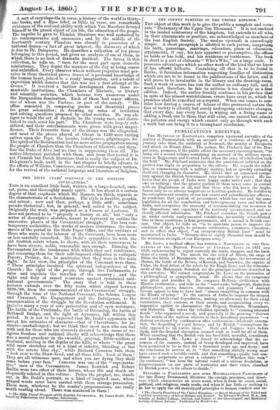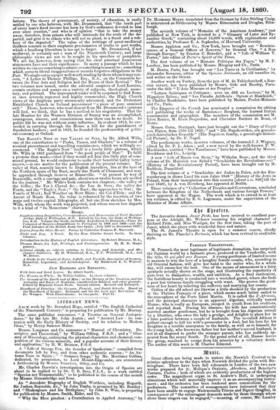PUBLICATIONS RECEIVED.
THE MUTINIES IN RAIPOOTANA COTOpTiSes a personal narrative of the mutiny at Nusseerabad, with an account of a residence at jodhpore, a journey into Sind, the outbreak at Neemuch, the mutiny at Erinpoora and attack on Mount Aboo. The author, Mr. Prichard, late of the Ben- gal army, promises, if the public afford the necessary encouragement, "to bring out a second volume containing an account of the military opera- tions in B.ajpootana and Central India when the army of retribution took the field." Mr. Prichard maintains that the punishment inflicted on the natives was slight in proportion to the offence. Ile regards the rebel- lion as commencing with a military mutiny, but as speedily extending itself and changing its character. lie thinks that an organized conspi- racy against the British Government may hereafter be proved. He be- lieves that the people of India were happy under native rule ; that they owe us nothing ; that the greater portion of them never came in contact with an Englishman at all, and that those who did, knew the Anglo- Saxon only as an adverse magistrate or hard tax-gatherer. He testifies to the corruption and venality of our law courts and subordinate law officers; he condemns that system of government which has one and the same legislation for all the numberless and heterogeneous races and tribes.of ! India, and recognizes the necessity of accommodating our measures to the dispositions and capacities of its variously circumstanced and va- riously affected inhabitants. Mr. Prichard considers the British power
as, under certain easily-secured conditions, irresistibly reiistablished. One of these conditions is firm government, and a second is British can- non. Our object, he tells us, "is to maintain peace, to improve the condition of the people, to promote civilization, commerce, education ; and to effect this object, "an overpowering British force" must be maintained in India. Seventy-five or eighty thousand men should be the minimum strength of our European army."
Mr. Lowe, a medical officer, has written a NARRATIVE or THE OPE- RATIONS OF THE BRITISH FORCES IN CENTILAL INDIA IN 1867 AND 1858, endeavouring to report correctly the trials, dangers, and the hard- "ships of a camp life. The march for the relief of Mhow the siege of Dhar, the battle of Mundasore, the siege of Rhatgur, the investment of Jhansi, the battle of the Betwa, of Koonch,_and Golowlee the capture of Calpe, the final defeat of the rebels by Sir Hugh Rose, and the reinstate- ment of the Maharajah Seindiah are the principal incidents described in this narrative. We cannot congratulate Mr. Lowe on the possession of a philosophical or sympathetic mind. He allows that our vengeance was great and justifies it. He compares Hellenic civilization with Ilindoo civilization ; and tells us the "semi-nude, belligerent, shameless philosophers, poets dancers, statesmen, and peasantry" of Ancient Greece appear to him to have had "almost everything in common with the Hindu of today." To the natives of India he imputes the deepest moral and intellectual degradation, making no allowance for their social institutions, their customs or their creeds, and accumulating every vi- tuperative epithet to characterize the Rajpoot, Brahmin, Mussulman and Mahratta. He refers the rebellion specially to " cunning educated fiends" who organized a revolt, and generally to the growing "distrust in the minds of the natives relative to their hereditary possessions distrust awakened by confiscation after confiscation—wholesale annexa- tion, the despoiling of royal houses, and by British "assumptions to- tally opposed to all native ideas." Oude and Nagporc were before them and the dreaded absorption seemed nigh at hand for all of them. While asserting that the British rule has been kind, merciful, considerate and beneficent, Mr. Lowe is forced to acknowledge that the re- sources of the country, instead of being developed and improved, have been permitted to lie as they did a thousand years ago and decay; and the conclusion he arrives at, is, "that something sinfully wrong must have caused such a terrible result, and that something equally bad con- tinues to perpetuate so great a calamity !" "Whether this ruin" (he continues) "has been the natural result of a vicious feudalism, or misgovernment on our parts of territories and their cities, absorbed by British power, is for others to decide."-
SPEECHES IN PARLIAanum AND SOME MISCELLANEOUS PAMPHLETS Of the late Henry Drummond, illustrate the energy, precision, and direct- ness which characterize an acute mind, when it finds its creed, social; political, and religious, readymade, and when it has. little or nothing to do but to apply the old stereotyped principles to human conduct and rer-
• The County Ratlines of fie Mailed Kingdom ; or Royal Manual of the Titled and Untitled Aristocracy of Great Britain and Ireland. By Edward Walford,
Scholar of Balliol College, Oxford, and Fellow, of the Genealogisal and Historical Society of Great Britain. Published by Hardoicke.
lations. The theory of government, of society, of education, is -ettirily settled by one who believes, with Mr. Drummond, that "the tenth part of every man'efixed income has been by God's ordinance devoted to him ever since creation," and who is of opinion "that to take the money away, therefore, from priests who will intercede for the souls of the de- parted, and give it to others who will not so plead, is a fraud and a rob- bery of the departed." The value of the writings of quasi-mediteval thinkers consists in their emphatic proclamation of truths or part truths, which a headlong liberalism is too apt to forget. Mr. Drummond, it not mediteval, is certainly not a man of the Nineteenth Century, and large philosophic views are not to be sought in his speeches or pamphlets. We are far, however, from saying that his clear punctual humourous statements have not their significance. In many a passage which he has written we can see something to admire or something to assent to ; something which corrects literal exaggerations or records forgotten obligations to the -Past. We single out as a paper well worth reading by those whom it may con- cern, "A Letter to Thomas Phillips, Esq., R.A., on the Connexion be- tween the Fine Arts and Religion and the Means of their Revival." The two volumes now issued, under the editorial auspices of Lord Loraine, contain orations and essays on a variety of subjects, theological, mone- tary, and political. The unprepared reader will be surprised to find Rome at once severely reproved and highly commended; the High Church views of the Anglican party strenuously advocated, and the Protestant Established Church in Ireland pronounced "a piece of pure unmixed evil." Those, however, who most dissent from Mr. Drummond's opinions will find, we think, that he has a method in his singularity. That the late Member for the Western Division of Surrey was an accomplished, courageous, sincere, and conscientious man there can be no doubt. In public life he was not without some influence. In or about 1813, he suc- ceeded in carrying through the House a bill for the punishment of fraudulent bankers' and in 1825, he founded the professorship of politi- cal economy at Oxford.
THE EAGLE'S NEST IN THE VALLEY OP SLX.T, by Mr. Alfred Wills, one of the contributors to "Peaks, Passes, and Glaciers," is a volume of scenical presentment and travelling reminiscence, which we willingly re- commend. "The Eagle's Nest" itself is a lovely little plateau, which Mr. Wills in 1857 purchased from "the good people of Sixt." To fulfil a promise then made,—that if they would sell him this little plot of com- munal ground, he would endeavour to make their beautiful valley better known,.—is one motive for the publication of the present volume. The valley of Sixt, scarcely known to English travellers, lies at the base of the Northern spurs of the Buet, nearly due North of Chamouni, and may be approched through Geneva or Bonneville. "At present by way of Bonneville, with a carriage and pair, about ten or twelve hours are needed for the journey." Mr. Wills's book contains ten chapters,—the valley of the Giffre the Per Cheval Sre. ; the Lac de Gers ; the valley des Fonds, and the "Eagle's Nest ; " the Buet; the approaches to Sixt ; the Fossils of Moed ; Bad Weather on Mont Blanc ; the Col d'Erin : and the Ascent of Monte Rosa. Its value is enhanced by the insertion of two maps and twelve capital lithographs, all but one from sketches by Mrs. Wills, with whom the work was projected, and whose recent loss imparts to it a kind of "In Memoriam" character.
BOOKS.
Supplementary Despatches, Correspondence, and Memoranda of Field Marshal Arthur Duke of Wellington, K.G. Edited by his Son, the Duke of Welling- ton, R.G. Volume the Sixth, including Expedition to Denmark—Plans for Conquest of Mexico—Expeditions to Portugvial in 1808 and 1809—and the First Advance of the British Army into Spain. [July 1807 to December 1810.1 Leaves from the Olive Mount. Poeraq by Catherine Frances B. Macready. Night and Day. A Novel. By the Hon. Charles Stuart Savile. In three volumes.
Introduction to the History of English Literature. By Robert Demons, M.A., Thomas Moore, his Life, 1Vritings, and Contemporaries. By H. IL Mont- gomery.
Lectures chiefly on subjects relating to Literary, and Scientific, and Me- chanics' Institutes. By H. Whitehead, M.A., T. C. Whitehead, M.A., and. W. Driver.
A Guide to the Coasts of Essex, Suffolk, and Norfolk, descriptive of Scenery, Historical, Legendary, and Archseological. By Mackenzie E. C. Walcott, M.A.
NEW EDITIONS AND REPRINTS.
Wild Oats and Dead Leares. By Albert Smith.
The Woman in White. By Wilkie Collins. In three volumes.
The Genesis of the Earth and of Man ; or the History of the Creation, and the Antiquity and Races of Mankind, considered on Biblical and other grounds. Edited by Reginald Stuart Poole. Second edition. Revised and Enlarged. Handbook of Painting : the German, Flemish, and Dutch Schools. Based on the Handbook of Kugler. Enlarged and for the most part Rewritten. By Dr. Waagen. With Illustrations. In two parts. Part II.



























 Previous page
Previous page